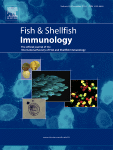Gut Associated Lymphoid Tissue (GALT) primary cells and stable cell lines as predictive models for intestinal health in rainbow trout (Oncorhynchus mykiss)

Abstract
The use of functional feeds for farmed fish is now regarded as a key factor in improving fish health and performance against infectious disease. However, the mechanisms by which these nutritional components modulate the immune response are not fully understood. The present study was undertaken to identify the suitability of both primary gut-associated lymphoid tissue (GALT) leucocyte cells and established rainbow trout cell lines as potential alternative methods to test functional feed ingredients prior to full fish feeding trials that can take months to complete. In addition to the primary GALT culture cells, the two rainbow cell lines RTS11 and RTgutGC which are from macrophage and gut epithelial cells, respectively. The cells were stimulated with a variety of pathogen associated molecular patterns (PAMPs) (PHA and Poly I:C) and recombinant rainbow trout IL-1b (rIL-1b), a proinflammatory cytokine, additionally two forms of b-glucan, a prebiotic commonly used aquafeeds were used as stimulants. From this, the suitability of cell models as a health screen for functional feeds was assessed. GALT leucocytes were deemed most effective to act as a health screen over the 4hr time point demonstrating responses to Poly I:C, PHA, and rIL-1b. RTS11 and RTgutGC also responded to the stimulants but did not give a strong T-cell response, most likely reflecting the nature of the cell type as opposed to the mixed cell populations from the primary GALT cell cultures. When stimulated with both forms of b-glucan, GALT leucocytes demonstrated a strong proinflammatory and T-cell response.

